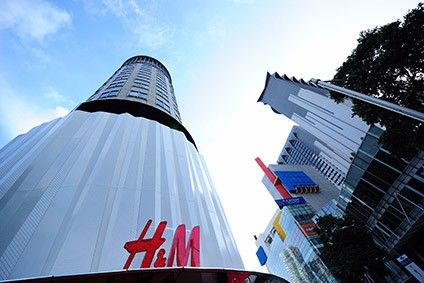
Profit at H&M has more than doubled in the first quarter – but the Swedish fashion retailer is bracing itself for the months ahead, with the global Covid-19 pandemic behind a 46% slump in net sales during March.
In the three months to the end of February, the group’s profit after tax more than doubled to SEK1.9bn (US$187.3m), compared to SEK803m ($79.1m) in the year-ago period.
Group sales increased by 8% to SEK55bn from SEK51bn last year. In local currencies, net sales increased by 5%. H&M said sales in the second half of the quarter were muted by the rapid outbreak of coronavirus, particularly in China, where revenue fell 84% in February.
Excluding the markets that were most affected by Covid-19 – China, Hong Kong, Singapore, Macau, Japan and Taiwan – sales were up 7% in local currencies. Online sales surged 48% in SEK and 44% in local currencies.
“The strong improvement in profit in the first quarter shows that customers appreciate our assortment and that our transformation work is having a good effect,” says CEO Helena Helmersson.
“The outbreak of coronavirus and the extraordinary public measures taken to reduce the spread of the virus have put people, communities, and companies in an exceptional situation. We are working very hard to manage this challenging situation in the best possible way, and in view of the dramatic decline in the market, we have to make difficult decisions and take forceful action. However, I am convinced that as a company – once we are through this – we will continue to stand strong.”

US Tariffs are shifting - will you react or anticipate?
Don’t let policy changes catch you off guard. Stay proactive with real-time data and expert analysis.
By GlobalDataAmong plans to shore up the business are reduced working hours in the markets affected by the corona situation – a move it says will globally affect tens of thousands of employees in all parts of the business. The group is also reviewing the need for redundancies, and says senior executives have taken a temporary 20% pay cut.
Second-quarter
Looking ahead, H&M warned the second quarter will “be very negatively impacted by the corona situation and will, therefore, be loss-making.”
As of 31 March, 3,778 of H&M’s 5,065 stores were temporarily closed, in a total of 54 markets – including all stores in Germany, the US, the UK, France, Italy and Spain, which are among its largest. Demand has also been subdued in many other markets due to the worry and uncertainty caused by the pandemic
Net sales in March 2020 tumbled by 46% in local currencies compared with March 2019. Online sales in the month increased by 17% in local currencies. Digital sales channels remain open in 47 of the group’s 51 online markets.
In China, however, H&M cited a gradual recovery as stores have reopened.
What the analysts say
Kate Ormrod, lead retail analyst at GlobalData, notes H&M’s global operation makes the challenge of dealing with Covid-19 all the harder – and that the pandemic is a “true baptism of fire” for Helmersson, who was named CEO earlier this year.
“Group Q1 sales growth of almost 8% is impressive against a tough comparative, especially as its performance was dragged down by China – its second-largest market in terms of store estate. Despite the effects of Covid-19, Q1 operating margin rose 2.9ppts to 4.9%, as H&M reaped the rewards of its extensive transformation plan – which we expect to help protect the retailer in the long run and ensure it can better cater to a post-coronavirus consumer.”
Ormrod adds that signs of recovery as stores reopen in China provides hope, but the expansion of Covid-19 throughout other regions has been “catastrophic” with sales in March falling by 46% in local currency, versus 7% growth last year, due to the large-scale store closures across key markets. Online provided some respite, however.
She concludes: “Protecting the business is a priority but just as it continues to lead the way on sustainability H&M has opportunity to set itself apart from other fast-fashion retailers by setting the standard when it comes to treating stakeholders ethically amid the crisis.
“Promising is the news that while H&M has halted new orders, it has committed to accepting goods and paying suppliers in full for orders already met or in production – in contrast to Primark.
“Producing PPE equipment and making donations is commendable, but all eyes are on how H&M treats its thousands of workers, with reduced working hours and temporary lay-offs already enacted and redundancies remaining on the table.”



